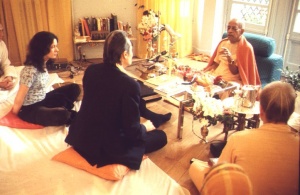SB 3.30.15: Difference between revisions
m (1 revision(s)) |
(Vanibot #0018 edit: make synonym terms in Sanskrit italic in SB - Vanisource) |
||
| Line 1: | Line 1: | ||
{{info | {{info | ||
|speaker=Lord Kapiladeva the Supreme Personaliy of Godhead | |speaker=Lord Kapiladeva the Supreme Personaliy of Godhead | ||
|listener=Devahūti, mother of Lord Kapiladeva | |listener=Devahūti, mother of Lord Kapiladeva | ||
}} | }} | ||
[[Category:Srimad-Bhagavatam - Canto 03 Chapter 30]] | |||
[[Category:Bhagavatam Verses Spoken by Lord Kapila - Vanisource|033015]] | |||
<div style="float:left">'''[[Srimad-Bhagavatam]] - [[SB 3|Third Canto]] - [[SB 3.30: Description by Lord Kapila of Adverse Fruitive Activities|Chapter 30: Description by Lord Kapila of Adverse Fruitive Activities]]'''</div> | |||
<div style="float:right">[[File:Go-previous.png|link=SB 3.30.14]] '''[[SB 3.30.14]] - [[SB 3.30.16]]''' [[File:Go-next.png|link=SB 3.30.16]]</div> | |||
{{RandomImage}} | |||
==== TEXT 15 ==== | ==== TEXT 15 ==== | ||
<div | <div class="verse"> | ||
āste 'vamatyopanyastaṁ | :āste 'vamatyopanyastaṁ | ||
gṛha-pāla ivāharan | :gṛha-pāla ivāharan | ||
āmayāvy apradīptāgnir | :āmayāvy apradīptāgnir | ||
alpāhāro 'lpa-ceṣṭitaḥ | :alpāhāro 'lpa-ceṣṭitaḥ | ||
</div> | </div> | ||
| Line 16: | Line 22: | ||
==== SYNONYMS ==== | ==== SYNONYMS ==== | ||
<div | <div class="synonyms"> | ||
''āste''—he remains; ''avamatyā''—negligently; ''upanyastam''—what is placed; ''gṛha-pālaḥ''—a dog; ''iva''—like; ''āharan''—eating; ''āmayāvī''—diseased; ''apradīpta-agniḥ''—having dyspepsia; ''alpa''—little; ''āhāraḥ''—eating; ''alpa''—little; ''ceṣṭitaḥ''—his activity. | |||
</div> | </div> | ||
| Line 23: | Line 29: | ||
==== TRANSLATION ==== | ==== TRANSLATION ==== | ||
<div | <div class="translation"> | ||
Thus he remains at home just like a pet dog and eats whatever is so negligently given to him. Afflicted with many illnesses, such as dyspepsia and loss of appetite, he eats only very small morsels of food, and he becomes an invalid, who cannot work any more. | Thus he remains at home just like a pet dog and eats whatever is so negligently given to him. Afflicted with many illnesses, such as dyspepsia and loss of appetite, he eats only very small morsels of food, and he becomes an invalid, who cannot work any more. | ||
</div> | </div> | ||
| Line 30: | Line 36: | ||
==== PURPORT ==== | ==== PURPORT ==== | ||
<div | <div class="purport"> | ||
Before meeting death one is sure to become a diseased invalid, and when he is neglected by his family members, his life becomes less than a dog's because he is put into so many miserable conditions. Vedic literatures enjoin, therefore, that before the arrival of such miserable conditions, one should leave home and die without the knowledge of his family members. If a man leaves home and dies without his family's knowing, that is considered to be a glorious death. But an attached family man wants his family members to carry him in a great procession even after his death, and although he will not be able to see how the procession goes, he still desires that his body be taken gorgeously in procession. Thus he is happy without even knowing where he has to go when he leaves his body for the next life. | Before meeting death one is sure to become a diseased invalid, and when he is neglected by his family members, his life becomes less than a dog's because he is put into so many miserable conditions. Vedic literatures enjoin, therefore, that before the arrival of such miserable conditions, one should leave home and die without the knowledge of his family members. If a man leaves home and dies without his family's knowing, that is considered to be a glorious death. But an attached family man wants his family members to carry him in a great procession even after his death, and although he will not be able to see how the procession goes, he still desires that his body be taken gorgeously in procession. Thus he is happy without even knowing where he has to go when he leaves his body for the next life. | ||
</div> | </div> | ||
__NOTOC__ | |||
<div style="float:right; clear:both;">[[File:Go-previous.png|link=SB 3.30.14]] '''[[SB 3.30.14]] - [[SB 3.30.16]]''' [[File:Go-next.png|link=SB 3.30.16]]</div> | |||
__NOTOC__ | |||
__NOEDITSECTION__ | |||
Revision as of 20:04, 30 November 2017

A.C. Bhaktivedanta Swami Prabhupada
TEXT 15
- āste 'vamatyopanyastaṁ
- gṛha-pāla ivāharan
- āmayāvy apradīptāgnir
- alpāhāro 'lpa-ceṣṭitaḥ
SYNONYMS
āste—he remains; avamatyā—negligently; upanyastam—what is placed; gṛha-pālaḥ—a dog; iva—like; āharan—eating; āmayāvī—diseased; apradīpta-agniḥ—having dyspepsia; alpa—little; āhāraḥ—eating; alpa—little; ceṣṭitaḥ—his activity.
TRANSLATION
Thus he remains at home just like a pet dog and eats whatever is so negligently given to him. Afflicted with many illnesses, such as dyspepsia and loss of appetite, he eats only very small morsels of food, and he becomes an invalid, who cannot work any more.
PURPORT
Before meeting death one is sure to become a diseased invalid, and when he is neglected by his family members, his life becomes less than a dog's because he is put into so many miserable conditions. Vedic literatures enjoin, therefore, that before the arrival of such miserable conditions, one should leave home and die without the knowledge of his family members. If a man leaves home and dies without his family's knowing, that is considered to be a glorious death. But an attached family man wants his family members to carry him in a great procession even after his death, and although he will not be able to see how the procession goes, he still desires that his body be taken gorgeously in procession. Thus he is happy without even knowing where he has to go when he leaves his body for the next life.